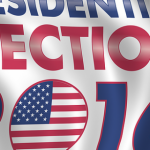US Election: Accusations of Fraud and Legal Challenges In a Divided Nation

In an extraordinary attempt to snatch victory from what appears to be the jaws of defeat, United States President Donald Trump has demanded that the counting of postal votes cease, made repeated claims of electoral fraud and mounted legal challenges in swing states.
As with the 2016 US election, this one has been signified by heightened tensions and claims of fraud and corruption – primarily levelled by Mr Trump and his supporters against the Democratic Party.
Taking it to the top
While the counting is still underway, Mr Trump has signalled plans to go all the way to the highest court in the United States, the Supreme Court, to challenge the legitimacy of postal votes – which have spiked as a result of Covid-19, numbering more than 65 million.
And there may be good reason for his last ditch effort, as 6 of the 9 justices of the Supreme Court were nominated by the Republican Party and are considered to be sympathetic to Mr Trump.
Democrats dominate postal votes
Pre-election research suggested that democratic voters were more likely to take up the postal vote option, and that prediction seems to have come to fruition – with such votes disproportionately favouring Joe Biden.
Trump has of course, made media headlines by alleging fraud and demanding a recount. But many believe he has little chance of winning the election by doing this, and that he is using it as a way to claim victimisation and continue to be relevant.
Sore loser?
Meanwhile, supporters of the Democratic Party are labelling Mr Trump’s moves as ‘temper tantrums’, and have called on him to concede defeat.
There’s not much to this, both sides have had their legal teams prepared for such potential challenges for several weeks – except perhaps that it reeks of the scent of ‘sore loser’.
The voting system in the United States
The US has an incredibly complex voting system.
Essentially, the constitution provides that individual states regulate the processes and procedures of elections to federal offices, such as early voting and voting by mail.
Such rules can, therefore, vary between states. Some states and counties, by custom, regulation or statute, count mail ballots after the election night counting of in-person votes. Others count these as they are received leading up to election day. Still others require that mail votes be received by election day; others require a postmark no later than election day but deadlines on receipt that vary by state.
It’s complicated
So, what does this mean? Well, there are 51 different voting systems. And it’s complicated.
But, there are over riding federal laws which frame and support the federal election process too. One such regulation decrees the ‘safe harbour’ period, which is a deadline by which all the states must have completed and certified their counting. This year, that period is 35 days. States officially have until December 8 to file results.
Challenging the election count
Then, if any legal challenges are to be mounted over counting concerns, they must be mounted in the individual state where the disparity is alleged to have occurred. The Supreme Court court does not hear direct challenges, but instead reviews cases that have worked their way up from lower courts.
Lawyers for Donald Trump’s campaign say they have already mounted legal challenges in Pennsylvania, Michigan and Georgia, “suing to stop Democrat election officials from hiding the ballot counting and processing from our Republican poll observers.” They are also seeking to intervene in a Pennsylvania case at the Supreme Court that dealt with whether ballots received up to three days after the election could be counted.
The case in Pennsylvania
And here’s where it gets interesting, simply because of the unprecedented circumstances presented by the Covid-19 pandemic.
According to experts in the US, Pennsylvania (which is one of the states Trump plans on contesting) passed a law in 2019 permitting mail-in voting and requiring that those ballots must be received by 8 p.m. on Election Day in order to be counted.
However, In September 2020, however, the Pennsylvania Supreme Court ruled that, given the Covid-19 pandemic, mail-in ballots can be counted if they are postmarked by 8 p.m. on November 3 and arrive at county boards of election by 5 p.m. on November 6.
The Pennsylvania Republican Party tried to have this later decision overruled and took the case to the US Supreme Court.
The US Supreme Court declined to take the Pennsylvania case on an expedited basis, although it made clear the case remains before it for potential consideration on the merits.
This resulted in a decision that mail-in ballots received after 8 p.m. on November 3 but before 5 p.m. on November 6 would be separated from the remainder of votes, allowing, as a practical matter, for the possibility that if the Supreme Court does take up the issue after the Pennsylvania vote count is completed, it will have the ability to essentially disqualify those votes that arrived after 8 p.m. on November 3 should it choose to do so.
In the meantime, if there is no clear-cut winner in the coming days, then it’s entirely possible that court outcomes could possibly end up deciding the US election.
In the US, election commentators are highly concerned that Trump is already alleging fraud and making threats of legal action, without letting due process run its course, going so far as to say it is an ‘extraordinary power grab.’
The only thing that’s currently clear is that Americans are obviously deeply divided on who should govern their country, and any ensuing battle in the courts, which may cause delays in a final result, will only serve to deepen that divide – whose actions can have significant consequences across the globe.







